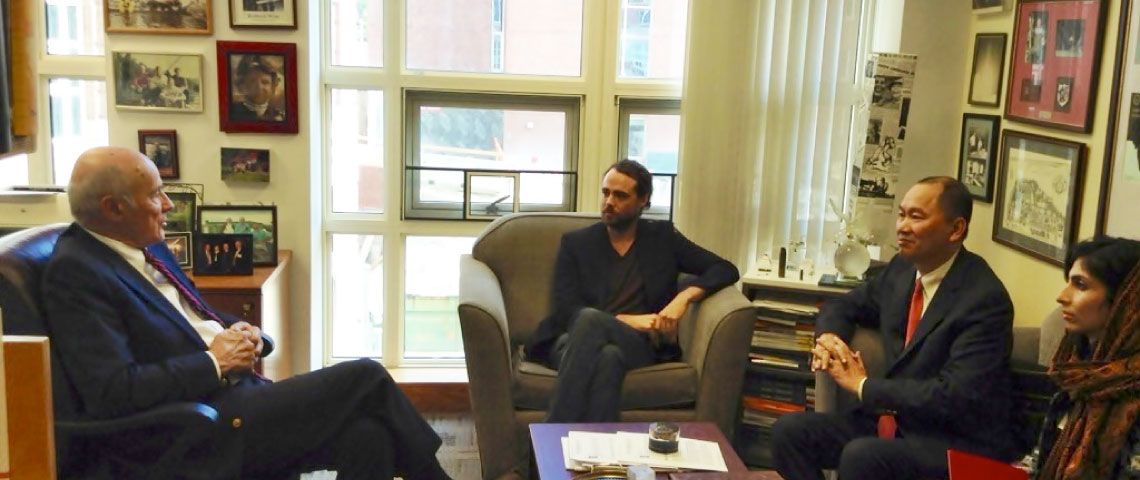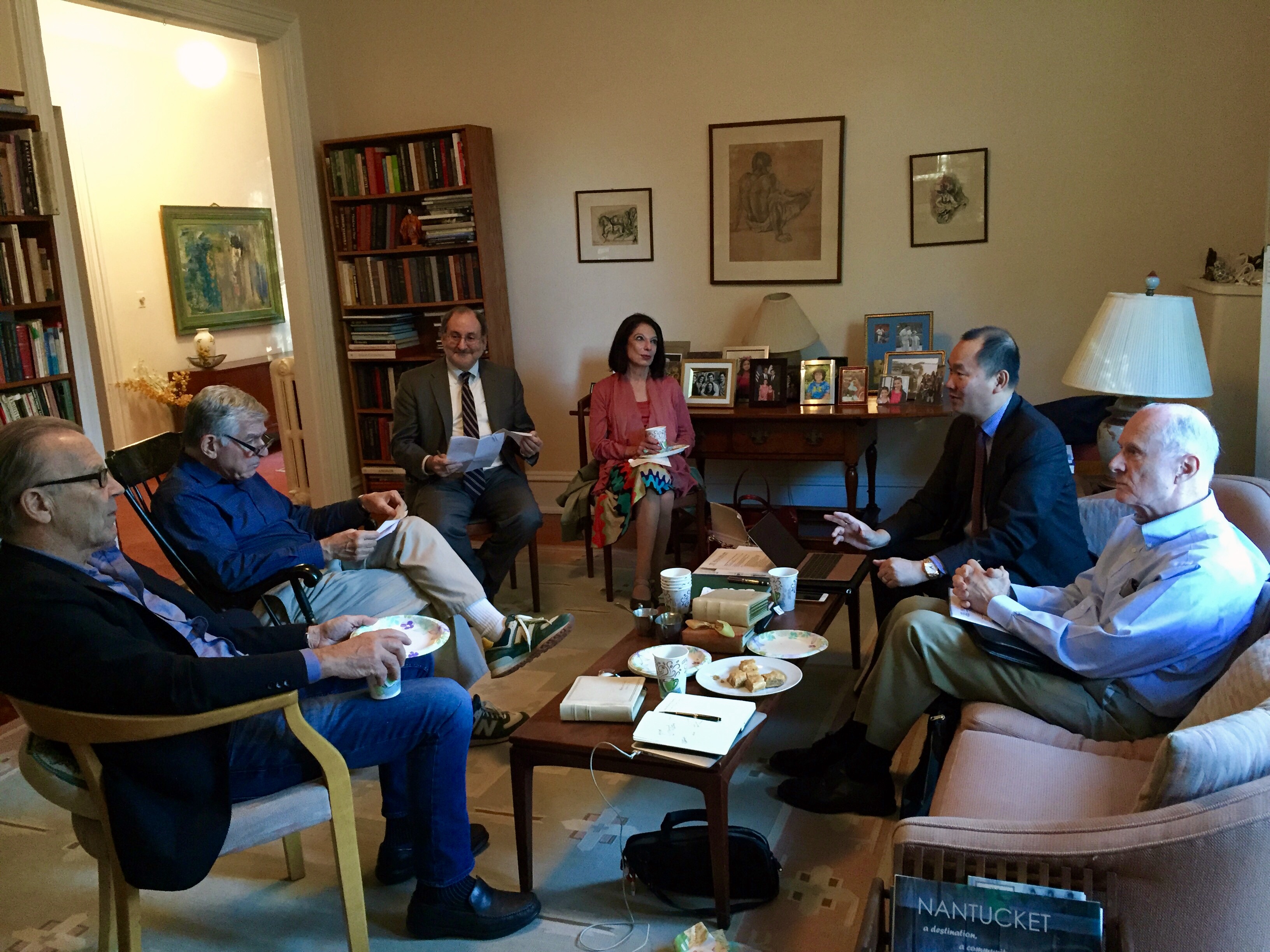
by BGF | Mar 11, 2019 | Highlights
China has been making a lot of waves on the media about its AI endeavors. The country is determined to build a global AI empire and seed the tech ecosystem of the future.
Not so fast.
President Trump signed an executive order last month to launch the US government’s AI strategy, called the American AI Initiative.
Last week, the Defense Advanced Research Projects Agency (DARPA) showcased nine ambitious projects as part of the AI Next initiative, a new five-year, $2 billion plan to bring about new advances in AI.
“We are harvesting the intellectual fruit that was planted decades ago,” says John Everett, deputy director of DARPA’s Information Innovation Office. “That’s why we’re looking at far forward challenges—challenges that might not come to fruition for a decade.”
China is thriving in AI because of an abundance of data. DARPA’s initiative is designed to keep the US ahead with the invention of the next big ideas. This AI war, if kept healthy, will shape our society in the future in a great way.
Going for and implementing “out-there” disruptive ideas is also what we have been doing with AIWS. AIWS is taking the lead in the policy space toward building a world society, where AI not only helps with advanced technologies, but also serves and strengthens democracy, human rights, and the rule of law.

by BGF | Mar 4, 2019 | News
Given the foreseeable pervasiveness of artificial intelligence (AI) in modern societies, it is legitimate and necessary to ask the question how this new technology must be shaped to support the maintenance and strengthening of constitutional democracy.
One side is negative:
https://www.technologyreview.com/s/613010/why-ai-is-a-threat-to-democracyand-what-we-can-do-to-stop-it/
One side is positive:
https://medium.com/s/story/what-would-more-democratic-a-i-look-like-ea729f5f7b0a
Boston Global Forum and Michael Dukakis Institute for Leadership and Innovation create AI World Society Initiative (AIWS)-G7 Summit Initiative will limited threats to democracy, and will make new model of democracy, make a better democracy. We will announce AIWS-G7 Summit Initiative on April 25, 2019, at the AIWS-G7 Summit Conference at Loeb House, Harvard University.

by BGF | Mar 4, 2019 | News
“I really believe in the future of space, and I think it’s important that we become a space-faring civilization and get out there among the stars,” Eron Musk said in a post-launch press conference after the successful launch of Drew Dragon, his company’s first capsule built to fly astronauts.
Early Saturday morning, March 2nd at 2:49AM EST, SpaceX launched its first Crew Dragon on a Falcon 9 rocket, sending the spacecraft to the International Space Station (ISS). It is currently chasing the ISS and will arrive at the orbiting lab early Sunday (March 3rd) for docking trials. The craft will return home on March 8th, off the coast of Florida.
It has been 17 years trying, and today’s launch proved a huge success for SpaceX. The spaceship is carrying, still, a stuffed toy pretending an astronaut. Musk is hopeful that the data obtained from the mission will help determine whether the crew module is ready to launch with people on board this July. And he would be happy to be a passenger one day soon.
AI World Society (AIWS) congratulates Elon Musk and SpaceX. SpaceX shows a very effective model via fast initiative and low cost. Boston Global Forum also are building the AI World Society – G7 Summit Initiative with a new model for society using deep applied AI, with more effectiveness, low cost, and fast initiative.

by BGF | Mar 4, 2019 | News
Autonomous vehicles are here, and they are here to stay. Most of the major automotive manufacturers (General Motors, Ford, Volkswagen, Toyota, Honda, Tesla, Volvo, and BMW) are actively exploring autonomous-vehicle programs and conducting extensive on-road testing.
Artificial Intelligence (AI) is a major focus for autonomous-vehicle testing and development, and the vehicles are applying AI—a collection of discrete technologies—in new and innovative ways. Deep learning, which mimics neuron activity, supports functions like voice and speech recognition, voice search, image recognition and processing, motion detection, and data analysis. Working together, these functions help the vehicles recognize pedestrian traffic, other vehicles on the road, and traffic signals, and adhere to mapped-out routes. Another research report forecasts that the automotive AI market will reach more than $10.5 billion by 2025.
According to AI World Society (AIWS), AI is a key enabled technology for autonomous-driving and people safety. In AIWS Ethics report, it also mentioned at least nine bills that relate to autonomous driving, including The SELF DRIVE ACT, which establishes the federal role in ensuring the safety of highly automated vehicles by encouraging the testing and deployment of such vehicles. The US Department of Transportation must require safety assessment certifications for the development of a highly automated vehicle or an automated driving system.

by BGF | Mar 4, 2019 | News
AI’s potential to improve the quality of our lives is unquestionable. On the other hand, there is a real risk that AI development may lead to inequalities and divides across many demographics. Inclusion, therefore, is an important matter for AI future. Amar Shar and Sandra Cortesi of Harvard explained why in a recent article published by the Harvard Business School Digital Initiative.
“There are pressing questions around discrimination, transparency and accountability, as well as privacy and safety of those who are using AI emerging technologies”. The article includes cases of exclusion and bias in AI applications and calls for more attention to address them. “Some global institutions are beginning to examine how AI can impact and contribute to the social good, but there is much work to be done”. The article highlighted the efforts by the Berkman Klein Center for Internet & Society, as an example, whose goal is to broaden the dialogue and engage many stakeholders, in particular those most likely biased.
In the same spirit, AI World Society (AIWS) is also making serious efforts toward equal treatment of people in AI. We strongly believe that the impact of AI must be thought of on a human scale, hence our initiative to examine the human side of AI and build an AI ethical framework, standards and models for the management and governance of AI, the development of AI products, and AI education.

by BGF | Mar 4, 2019 | News
According to the World Economic Forum, Artificial Intelligence (AI) is set to create 58 million new roles and career opportunities by 2022.
The report says that “75 million jobs may be displaced by a shift in the division of labor between humans and machines, while 133 million new roles may emerge that are more adapted to the new division of labor between humans, machines and algorithms.”
Jeff Wong, Global Chief Innovation Officer at EY, also further elaborated that “It is true that AI will continue to disrupt the workforce, but like all other defining technologies, AI will also create new types of jobs and new career paths.”
AI always result in job displacement, which is unavoidable, AI also ultimately create new industries and opportunities. Another important thing to note is that automation cannot replace human performance jobs like management or unpredictable environment jobs such as plumbers or healthcare providers.
According to the AI World Society (AIWS), AI is a disruptive technology with strong impact to our society. It enforces governments beginning to address the issues related to AI through national strategies, laws and regulations. Especially, AIWS also highlighted the importance of AI and Ethics from different countries, including The AI JOBS Act, which requires the US Department of Labor to prepare and submit to Congress a report on AI and its impact on the workforce.

by BGF | Mar 4, 2019 | News
Prime Minister Shinzo Abe mention about US-North Korea Summit Meeting in his New Year’s Reflection:
“This year we will also take on immense challenges on the diplomatic front. As we encounter major turning points such as the U.S.-North Korea summit meeting, Japan-Russia peace treaty negotiations, and the arrival of a new era in Japan-China relations, we will resolutely advance a total reassessment of Japan’s postwar diplomacy.”
Boston Global Forum presented the World Leader for Peace, and Cybersecurity Award to Prime Minister Shinzo Abe at Global Cybersecurity Day on December 12, 2015 at Harvard University Faculty Club.

by BGF | Mar 4, 2019 | Highlights
Jakub Langr, cofounder of brainpool.ai, a network of AI experts, and a guest lecturer at Oxford, recently wrote a post on Forbes.com about how Generative Adversarial Networks (GANs) are shaping the future of AI.
One of the most promising innovations of AI, GAN enables creativity in AI development. GANs can produce a painting as if it were the work of a creative and skillful painter. Langr also listed GAN’s applicability in other sectors, among them, helping cancer detection by creating new, realistic scans and applying both defensively and offensively in cybersecurity. GAN is one of the areas of AI that are “growing by leaps and bounds every six months”.
“But with the ability to generate new data or imagery, GANs also have the capacity to be dangerous”, Langr noted, as they can create fake contents that look real. Therefore, “ethics is a key topic “, which is covered in his book, “GANs in Action: Deep learning with Generative Adversarial Networks”.
The article raises the need to define public AI policy more than the public perception of AI and its dangers. The industry should play a more active role in this matter. If good public AI policies are in place, GAN will be one of the brightest hopes in shaping AI innovation, serving people in an ethical way.
Boston Global Forum and Michael Dukakis Institute for Leadership and Innovation generated the AI World Society (AIWS) Initiative 7 Layer Model, and GAN could play an important role in creating applications of layer 6 and layer 7 of the model.

by BGF | Feb 24, 2019 | Highlights
Steve Lohr of the New York Times recently wrote about a three-day gathering on AI regulation at MIT in January 2019.

Senior policymakers representing countries in the 36-nation Organization for Economic Cooperation and Development (OECD) came together in hopes of reaching a coherence for AI policy by this summer. Their recommendations could be used to set standards in many countries and help shape the future of AI developments for years to come.
At the event, Daniel Weitzner, a former policy adviser under President Obama, suggested, “If you want people to trust this stuff, the government has to play a role.” On the other hand, policymakers at the event agreed that the AI train should be allowed to flourish. Japan is investing heavily on AI with a particular emphasis on “start-ups, small companies and young people,” said Professor Osamu Sudoh of the University of Tokyo, a senior adviser to the Japanese government on AI strategy.
At the same time, international cooperation is encouraged to bridge differences between the superpower and the not. “The era of moving fast and breaking everything is coming to a close,” said R. David Edelman, MIT director of the project on technology, policy, and national security.
OECD’s efforts toward shaping the futures of AI have been recognized by AIWS. In 2018, Governor Dukakis on behalf of AIWS presented Secretary-General Angel Gurría of OECD with the 2018 Leader in AI World Society Award. This award honors a global leader with commendable leadership and forward thinking in AI. AIWS looks forward to further collaboration with OECD in the future.









